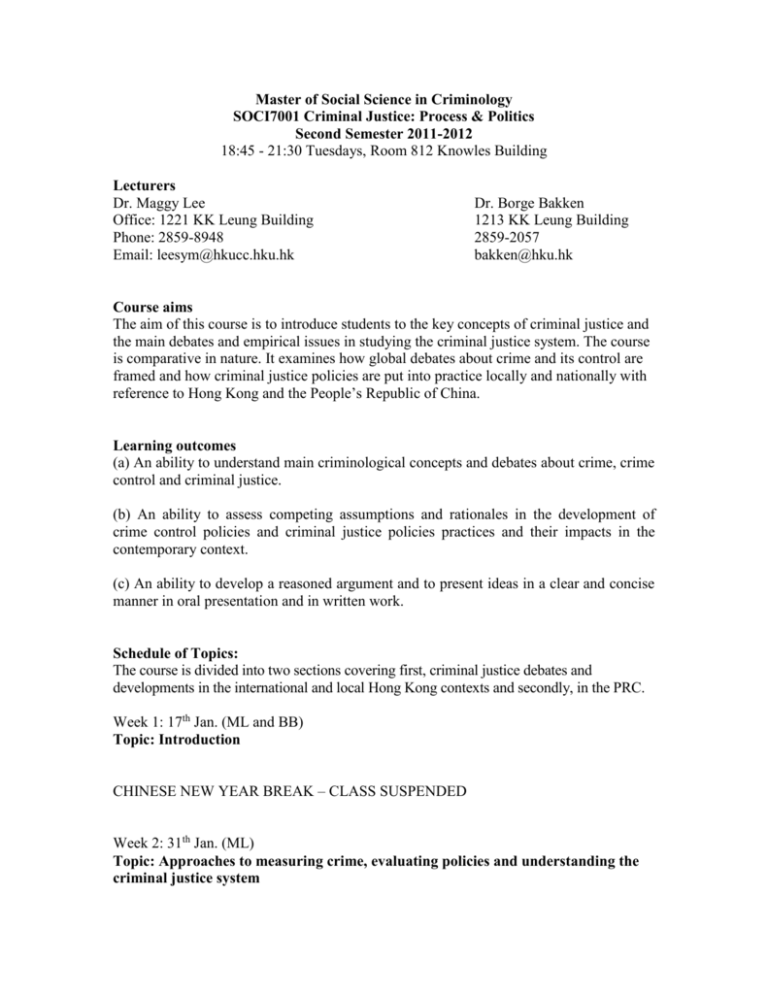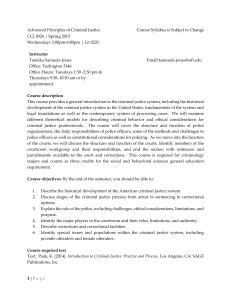
Master of Social Science in Criminology
SOCI7001 Criminal Justice: Process & Politics
Second Semester 2011-2012
18:45 - 21:30 Tuesdays, Room 812 Knowles Building
Lecturers
Dr. Maggy Lee
Office: 1221 KK Leung Building
Phone: 2859-8948
Email: leesym@hkucc.hku.hk
Dr. Borge Bakken
1213 KK Leung Building
2859-2057
bakken@hku.hk
Course aims
The aim of this course is to introduce students to the key concepts of criminal justice and
the main debates and empirical issues in studying the criminal justice system. The course
is comparative in nature. It examines how global debates about crime and its control are
framed and how criminal justice policies are put into practice locally and nationally with
reference to Hong Kong and the People’s Republic of China.
Learning outcomes
(a) An ability to understand main criminological concepts and debates about crime, crime
control and criminal justice.
(b) An ability to assess competing assumptions and rationales in the development of
crime control policies and criminal justice policies practices and their impacts in the
contemporary context.
(c) An ability to develop a reasoned argument and to present ideas in a clear and concise
manner in oral presentation and in written work.
Schedule of Topics:
The course is divided into two sections covering first, criminal justice debates and
developments in the international and local Hong Kong contexts and secondly, in the PRC.
Week 1: 17th Jan. (ML and BB)
Topic: Introduction
CHINESE NEW YEAR BREAK – CLASS SUSPENDED
Week 2: 31th Jan. (ML)
Topic: Approaches to measuring crime, evaluating policies and understanding the
criminal justice system
Week 3: 7th Feb. (ML)
Topic: From Policing the Colony to Service Quality for “Asia’s World Class City”
Week 4: 14th Feb. (ML)
Topic: Crime Prevention and Routine Activities in Everyday Life
Week 5: 21st Feb. (ML)
Topic: What Works in Criminal Justice?
Week 6: 28th Feb. (ML)
Topic: The Treatment of Victims in the Criminal Justice System
Week 7: 6th March (BB)
Topic: History of Criminal Justice in China
Week 8: 13th March (BB)
Topic: Court Theatres: Courts and Law in the People’s Republic of China
Week 9: 20th March (BB)
Topic: Street Theatres: Punishment, Criminal Justice, and “People’s Revenge”
Week 10: 10th April (BB)
Topic: Contract Policing in the People’s Republic of China
Week 11: 17th April (BB)
Topic: Chinese Prisons and Corrections. Laogai (劳改) and Laojiao (劳教).
Week 12: 24th April (ML and BB)
Conclusion
Assessment
Students are required to attend and actively participate in class. As a reminder of the
MSocSc programme’s policy, if a student should miss a class, it is their responsibility to
inform the teacher (preferably in advance) along with the reason. Students may be
required to produce appropriate documentation. Students who miss more than three
classes will be penalized (this may range from deduction of the overall course grade to
not being permitted to take the final examination). The penalty will be determined by a
panel of teachers in the programme and the student may be called upon to appear before
the panel.
The final grade for the course is based on coursework (50%) and an examination at the
end of the term (50%). The coursework portion of the grade is based on three elements:
2
1. Active class participation (not simply attendance) (5%)
2. Portfolio (25%) - Students will keep a portfolio on what they are learning in class
and the readings. Students should choose any 6 out of 10 weekly topics and write
2-3 pages (about 750 words) discussing what they learned on each topic. In doing
so, the discussion should integrate key concepts discussed in lectures, readings
and any class discussion. You must demonstrate evidence of independent reading
and your critical engagement with relevant literature (and citing full references).
Do not be descriptive or simply repeat the lecture notes - be analytical!
The first half of the portfolio (weeks 2-6) should be turned in at the lecture in
Week 8 (13th March). The second half of the portfolio (covering weeks 7 -11)
should be submitted to the Department of Sociology Office by Friday 4th May.
Please be reminded that plagiarism will not be tolerated and will result in an
automatic zero grade AND will be reported to the University.
3. Group presentation and write up (20%) – Students will be organized into small
groups for the semester. Students should select one of the weekly topics from the
course and will be expected to engage with current debates and examples related
to the criminal justice system locally or in the PRC. The group will be given a
presentation mark (10%) and the write-up should be based on each individual’s
contribution to the group (10%). Time will be allotted during class time for
students to work on their presentation. The presentation schedule will be given
out once all topics are assigned. The write-up will be due two weeks after the
presentation.
Readings
The required readings for this course have been selected from a variety of sources, including
both original readings of the major theorists and interpretations and applications of their
ideas. See schedule below for weekly reading schedule. The required readings are provided
in the form of a course pack, and students may purchase the packet through the campus
copy center, located next to the Park n’ Shop.
There are two local texts which may be of particular interest:
Chui Wing Hong and Lo Wing T. (2008) Understanding Criminal Justice in Hong Kong.
Devon, UK: Willan Publishing.
Jones, C. (2007) Criminal Justice in Hong Kong. London: Routledge.
3
Weekly readings
Week 2
Topic: Approaches to measuring crime, evaluating policies and understanding the
criminal justice system
Required readings:
Malcolm Davies et al. (2005), Criminal Justice, Harlow: Longman. Chapter 1.
Chui Wing Hong and Lo Wing T. (2008) Understanding Criminal Justice in Hong Kong.
Devon, UK: Willan (ebook Chapter 1).
Additional readings:
Karstedt, Susanne (2001) ‘Comparing cultures, comparing crime: Challenges, prospects
and problems for a global criminology’, Crime, Law and Social Change, 36(3): 285-308.
Week 3
Topic: From Policing the Colony to Service Quality for “Asia’s World Class City”
Required Readings:
Waddington, D. (2007), ‘Policing of public order’, Policing, Vol 1 (4): 375-377.
http://policing.oxfordjournals.org/content/1/4/375.full.pdf+html
Waddington, D. (2007), ‘Seattle and its aftershock: some implications for theory and practice’,
Policing, Vol 1 (4): 380-389.
http://policing.oxfordjournals.org/content/1/4/380.full.pdf+html
Jones, T. and Newburn, T. (2002) The Transformation of Policing? British Journal of
Criminology. 42: 129-146.
Punch, M. (2003), ‘Rotten orchards: “pestilence”, police misconduct and system failure’,
Policing and Society, 13(2): 171-196.
Additional readings:
Jones, C. (2007), Criminal Justice in Hong Kong, London: Routledge (Chapter 25).
4
Bowling, B. Marks, A. And Murphy, C. (2008) ‘Crime control technologies’ in R.
Brownsword and K. Yeung, Regulating Technologies, Oxford: Hart (ebook).
Week 4
Topic: Crime Prevention and Routine Activities in Everyday Life
Required readings:
M. Felson, ‘The routine activity approach as a general crime theory’ in McLaughlin et al.
(eds.) (2003), Criminological Perspectives – Essential Readings (London: Sage).
Malcolm Davies et al. (2005), Criminal Justice, Harlow: Longman (Chapter 5).
McLaughlin, E. and Muncie, J. (1998), ‘Walled cities: surveillance, regulation and
segregation’ in Mooney, G. et al. (eds.), Unruly Cities?, London: Routledge.
Additional readings:
Clarke, R. (2003), ‘Situational crime prevention: theory and practice’ in E. McLaughlin
et al. (eds.), Criminological Perspectives – Essential Readings (London: Sage).
Felson, M. (2000), ‘The routine activity approach as a general social theory’ in S.
Simpson (ed), Of Crime and Criminality: The Use of Theory in Everyday Life, Thousand
Oaks, CA: Pine Forge Press.
Garland, D. (1996), ‘The Limits of the Sovereign State: Strategies of Crime and Control
in Contemporary Society’, British Journal of Criminology, Vol. 36, No. 4, pp.445-471.
Davis, M. (1992), City of Quartz, London: Verso.
Week 5
Topic: What Works in Criminal Justice?
Required readings:
Malcolm Davies et al. (2005), Criminal Justice, Harlow: Longman. (Chapter 12).
Cavadino, M. and Dignan, J. (2006) ‘Penal policy and political economy’, Criminology
and Criminal Justice 6(4): 433-456.
5
Willis, K. et al. (2011), Measuring the effectiveness of drug law enforcement, Australian
Government: Australian Institute of Criminology.
http://www.aic.gov.au/publications/current%20series/tandi/401-420/tandi406.aspx
Additional readings:
Chui Wing Hong and Lo Wing T. (2008) Understanding Criminal Justice in Hong Kong.
Devon, UK: Willan (ebook Chapter 8).
Pratt, J. (2008) ‘Scandinavian Exceptionalism in an Era of Penal Excess’ Parts 1 and 2,
British Journal of Criminology 48(2) & 48(3).
Downes, D. (2001) ‘The Macho Penal Economy: Mass Incarceration in the United States
– A European Perspective’, Punishment and Society 3(1): 61-80.
Week 6
Topic: The treatment of victims in the criminal justice system
Required readings:
Goodey, J. (2005), Victims and Victimology, Harlow: Pearson Longman.
Additional readings:
Newburn, T. (2003), Crime and Criminal Justice Policy, London: Longman.
Chui Wing Hong and Lo Wing T. (2008) Understanding Criminal Justice in Hong Kong.
Devon, UK: Willan (ebook Chapter 4).
Walklate, S. (2007) (ed), Handbook of Victims and Victimology, Cullompton: Willan.
Week 7
Topic: History of Criminal Justice in China
Readings:
K. Mühlhahn (2009), Criminal Justice in China – A History, Cambridge: Harvard
University Press (‘The right degree of pain: Imperial China’ (pp. 14-57).
6
Week 8
Topic: Court Theatres: Courts and Law in the People’s Republic of China
Readings:
Yingyi Situ and Weizheng Liu, “The Criminal Justice System in China”, in Obi N.I. Ebbe
(ed.), Comparative & International Criminal Justice Systems: Policing, Judiciary, and
Corrections, 2nd. Edition, Boston, Butterworth–Heinemann, 2000, pp. 129-142
Susan Trevaskes, Courts and Criminal Justice in Contemporary China, Lanham,
Lexington Books 2007, Chapter 2: Courts on Trial pp. 29-59
Week 9
Topic: Street Theatres: Punishment, Criminal Justice, and “People’s Revenge”
Readings:
Børge Bakken, "China. The Punitive Society?" Unpublished manuscript, 2008, (21
pages).
Susan Trevaskes, Courts and Criminal Justice in Contemporary China, Lanham,
Lexington Books 2007, Chapter 3: Expressive Punishment: The Court Sentencing Rally,
pp. 59-79.
Week 10
Topic: Contract Policing in the People’s Republic of China
Readings:
Børge Bakken, Policing in Chinese Societies, Hong Kong, Open University, 2005, Unit
3, pp. 17-62
Michael Dutton, Toward a Government of the Contract: Policing in the Era of Reform, in
Børge Bakken (ed.), Crime, Punishment, and Policing in China, Lanham, New York,
2.ed. 2007, pp. 189-235 (excerpts, 19 p.)
Week 11
Topic: Chinese Prisons and Corrections. Laogai (劳改) and Laojiao (劳教).
7
Readings:
James D. Seymour, Sizing up China’s Prisons, in Børge Bakken (ed.), Crime,
Punishment, and Policing in China, Lanham, New York, 2.ed. 2007, pp. 141-161
Fu Hualing, "Re-education through Labour in Historical Perspective", The China
Quarterly, Volume 184, December 2005, pp 811-830.
8










